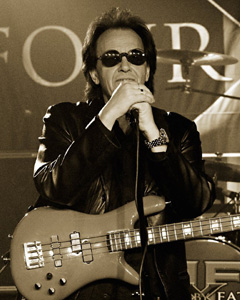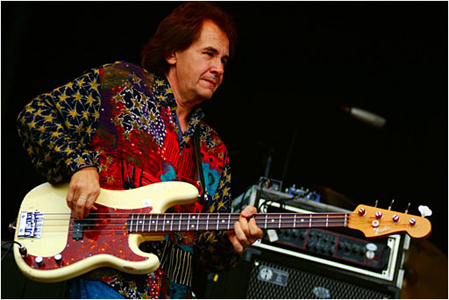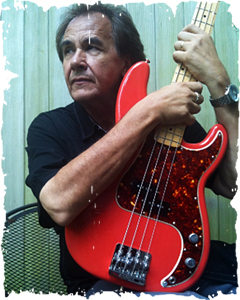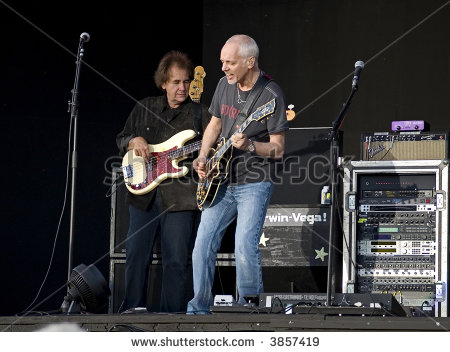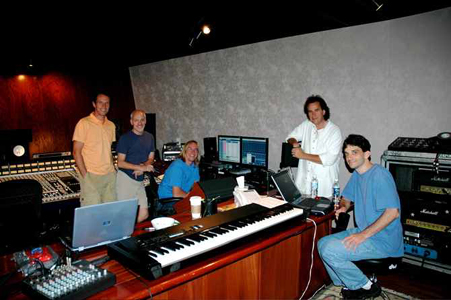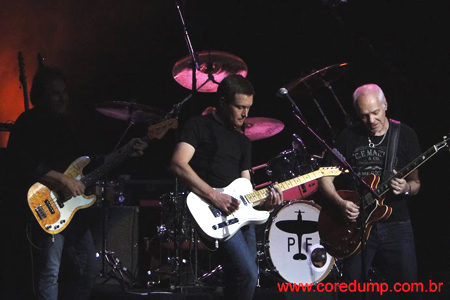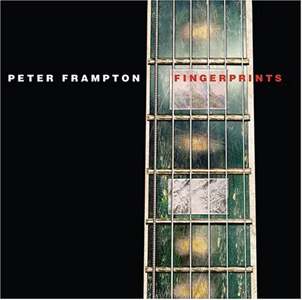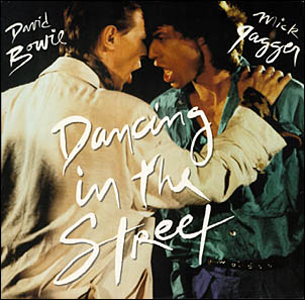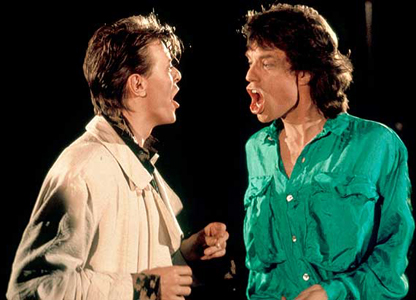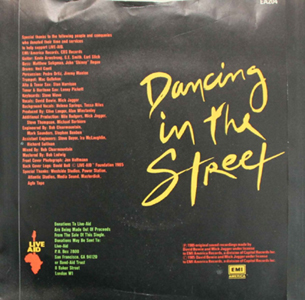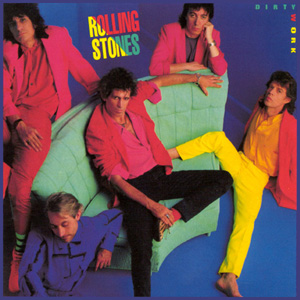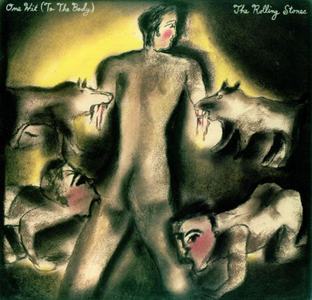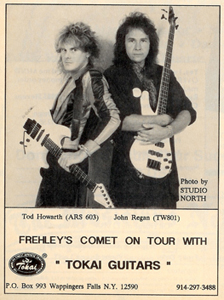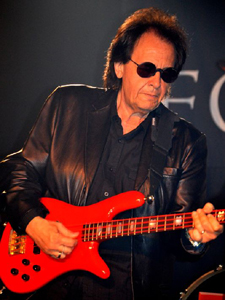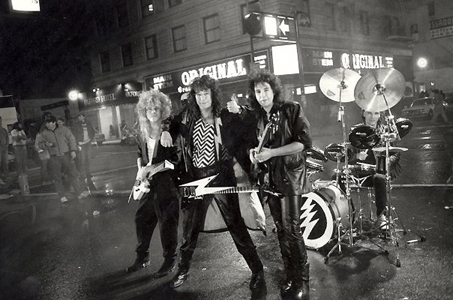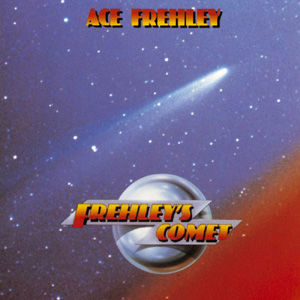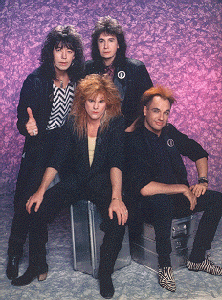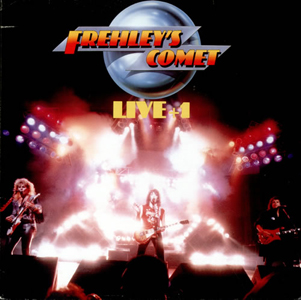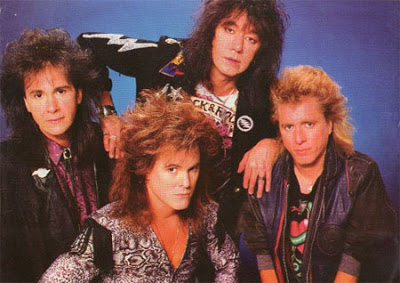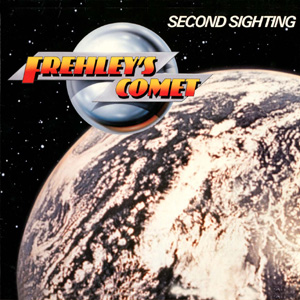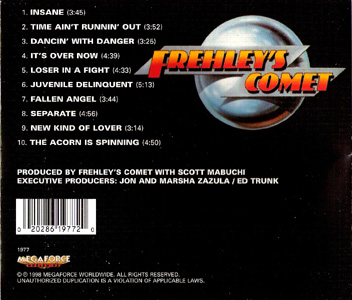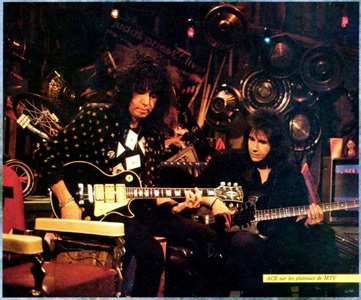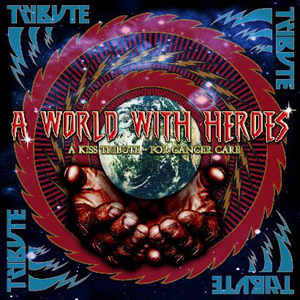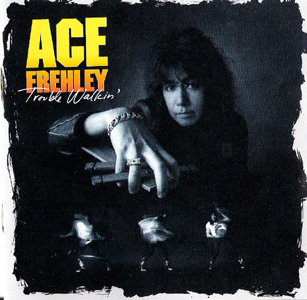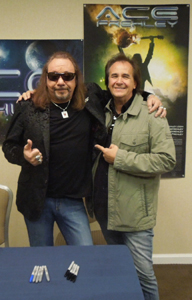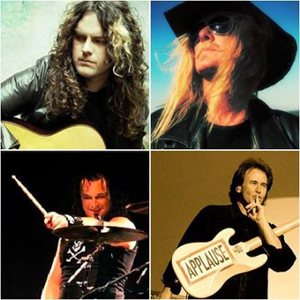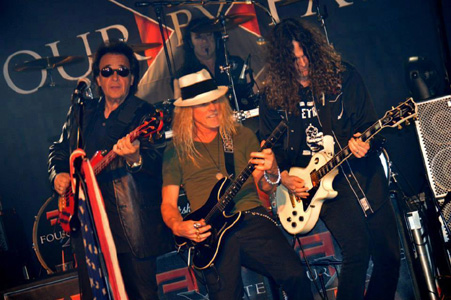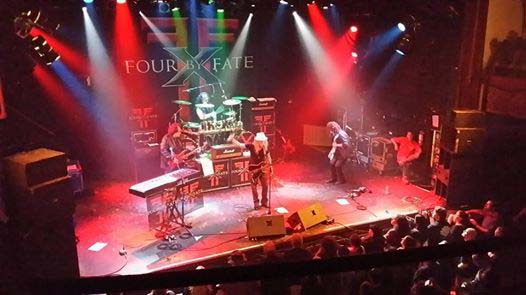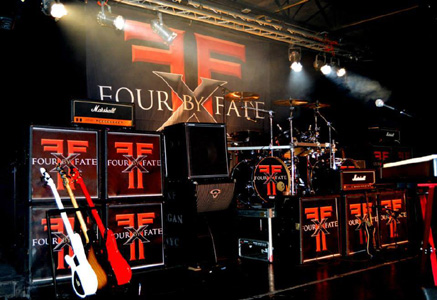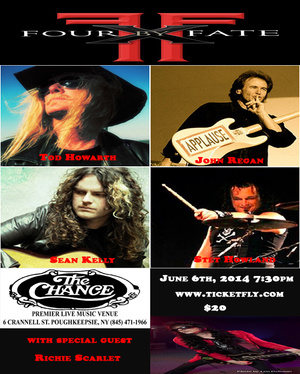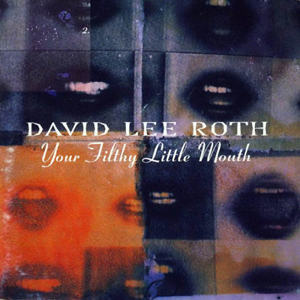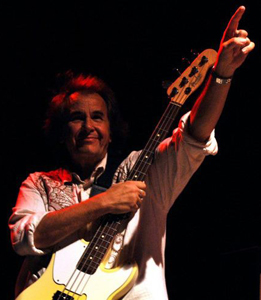|
An Interview with 'John Regan'
Bassist of Four By Fate and formerly of Frehley’s Comet & Peter Frampton that took place on Friday June 20th, 2014. Interviewed by Glenn Milligan. Glenn: Hello. John: Hello it’s John Regan. Glenn: Hi how are you doing? John: Good. Good to hear from you. Glenn: What got you into playing bass? John: I was at high school playing baritone saxophone. I was a big Gerry Mulligan fan. Well...it seems that my hair gotten a bit too long, and my Father made me go and get a haircut... on the way to the barber, I was running down the hill and slipped on a patch of ice and broke my leg… Glenn: Ouch! John: …My best friend at the time, Ben Levine was a bass player. I couldn't practise baritone sax – it was too cumbersome for the cast I had on my leg so he lent me a Hagstrom Bass and I remember learning The Young Rascals version of ‘Mustang Sally’ – it’s the first song I ever learnt on bass and that was it and I never went back. Glenn: Cool. What was the first bass you had and how did you get it? John: I ended up buying a red Hagstrom. It must have been from the late 60’s – the red plastic Hagstrom. I wish I still had it. It was a great guitar.
Glenn: What artists influenced you and what bass guitarists in general and why? John: Well at the top of the list you've always got McCartney and right there with McCartney... for me it’s been Bill Wyman. But actually the bass player that I really, really listened to and studied was Ronnie Wood! We had a band… a local band – a bunch of guys would play around here in different church functions and dances and school dances, and we got tickets to go down and see The Jeff Beck Group when Ronnie Wood was playing bass with them. It was at the Fillmore East in New York City. That night changed my life. When I heard Ronnie Wood play bass it sounded like IRT subway coming at me and I went home straight away and I ripped the flat-line strings off my guitar and I bought a set of Roto Sounds. Well Ronnie Wood playing bass in the Jeff Beck Group – attitude-wise – really, really had a big impact on me. But look, it’s Entwistle… the list goes on. I have to say of the American Bass players, James Jamerson – all the Motown stuff. So it was a pretty wide swath of influence back then. There was so much incredible music coming out from England especially for us young guys here in America and our home-grown Motown stuff. Glenn: It’s cool that you mentioned Ronnie Wood when he was in The Jeff Beck Group because I’m just currently reading Rod Stewart’s Autobiography and he actually talks about them playing those Fillmore shows as well so that’s pretty cool and uncanny. John: It was interesting because that show, Jethro Tull opened for them and you could tell… first of all they came out and it was their first American Tour and they absolutely destroyed the place. It was unbelievable. Then Jeff Beck came out and either Rod wasn’t feeling well or they were not really on good terms anymore but they only played for about 30 minutes. It was a bit disappointing from that aspect but for me, seeing Ronnie Wood and hearing Ronnie Wood just galvanised that I wanted to be a bass player for the rest of my life. Glenn: Yeah. What were the first bands like that you were part of and how were your first gigs? John: Well the first gigs around here growing up in the 60’s, they were school dances and battle of the bands and stuff like that and it was great fun. When we all started nobody thought we were gonna make any money at this. Most musicians I talked to said they did it because it was a great way to pick up girls. Glenn: Yeah. John: It was actually just for the pure joy of it and I found from time to time you had to try and get back. You can get away from that being in the business end as a professional musician or as a professional anything. I find that you’ve got to set yourself back for what’s important and that happened for me a couple of years back. The late, Levon Helm was doing these midnight rambles up at his house in Woodstock, and I remember being a bit discouraged with the music biz at the time. a dear friend of mine JD, asked me to go up and check out Levon and his band. The place only seated about 150 people but the joy that was coming off that stage… They weren’t playing for 10,000 people. It wasn’t anything ego boosting but they were playing music for all the right reasons.
Glenn: Awesome. What brought you into playing in the big league of artists? How did you make that jump from playing with small bands to people like Peter Frampton? John: Well we had a club band that was playing four or five nights a week and making a really nice living but obviously that’s a dead end and you can’t keep doing that forever...and a very good friend of mine, Joe Renda ended up partnering with Jon Voight, the actor and Chip Taylor who was John’s Brother. Chip wrote ‘Wild Thing’ , ‘Angel Of The Morning’ and a lot of other songs. They were like childhood friends and they started a recording studio in Westchester, New York which is about an hour south of me. I basically told me friend Joe, I said, “Listen I’ll come down and play bass for free. I want the experience. I wanna get the red light jitters out of the way when you hit the record button. I want all the experience I can get”. I did that. I’d get up early in the morning after a late night playing clubs and I’d drive down there and play for free on sessions and low and behold one night, Bobby Mayo, who unfortunately is not with us anymore called up Joe at the studio... because Bobby lived nearby and said, “Listen, Frampton needs a bass player”, and this was a Tuesday night and he needed a bass player on tour on Friday. So my buddy said “Well I’ve got a guy that’s been coming in here that I think might fit the bill”. So Joe Renda had a lot more faith in me than I had in myself. Joe calls me up and he goes, “Listen, do you wanna play with Peter Frampton?”, and this was 1979, Peter was still at the top of the list and I said, “Get outta here, what are you calling me for?”, he goes, “ No Frampton needs a bass player. Get down here now, meet Bobby”. I got in my car, I drove as fast as I could, I met Bobby Mayo, he handed me a pile of records and it was about a two hour set and this was Tuesday night. He goes, “You gotta be ready by Friday evening”, so I said, “I’ll be there”. I drove back home, asked the wife to put on a few pots of coffee and I literally stayed up for 48 hours learning that set…
Glenn: Wow! John: …and that turned into a 31 year relationship with Peter. Glenn: Nice. What were the highlights of working with Peter? John: Well first night because we did not even do a sound-check. It was literally out of the car, onto the stage – trial by fire as they say. I was concentrating so hard that I just remember occasionally from my peripheral vision, I’d catch Peter glancing over and smiling, so I figure, ‘Okay, I’m not fired to night – I made it this far’. (We laugh)
That was an amazing feeling and the other great feeling was a few years back. We were touring and Peter decided to do an instrumental record and that was at the urging of his lifelong friend, David Bowie. Dave actually planted that seed in his head to do an instrumental because he knew what a great guitar player he was. So he did an instrumental record called ‘Fingerprints’ and it ended up winning him a Grammy for ‘Best Instrumental Record Of The Year’ about seven or eight years ago. That was definitely a high point in as much as I was just happy for him, and so proud to have contributed the opening track “Boot It Up”, and played bass on the record as well. I knew what a great guitar player he was and obviously a lot of the focus of his mega-stardom came from the “look” rather than the talent. The focus was on his HAIR... he was a pin-up boy but he never stopped being an incredible guitarist. He used to amaze me every tour, every year we would go out, we’d be playing a lot of the same songs but he’d bring something fresh into them every single night and he’s still out there doing it now.
Glenn: Cool. You mentioned Bowie and I think the first time I really heard you and I didn't realise obviously at the time until now was on ‘Dancing In The Street’ when it was heard on Live Aid around the World at the same time. How did that come about? John: That came about when a friend of mine, Rob Sabino who was Nile Rodger’s keyboard player in the heyday when he was producing all the big hit records. He did Bowie’s album, he did all the Madonna stuff, the Powerstation.. So many great records Nile produced in that period and Rob was his Main Man keyboard player... and again I was at that same studio, owned by my friend Joe Renda’s, called ‘Northlake Sound’ in the White Plains, New York. Everybody in the room were recording and a phone call came in and it was Rob Sabino, and he goes, “I recommended you to Nile Rodgers for a session but it doesn’t pay anything”, and I said, “Well that’s okay, I’d love to work with Nile – I’m a big fan of his”, he goes, “Yep just come on down to Manhattan. Now we wanna replace a bass part that they have on a track that they weren't quite happy with the sound of” and I said, “I’ll be there”. So I get there and low and behold, there’s Nile Rodgers and it’s for Live Aid and it’s Bowie & Jagger's‘Dancing In The Street’.
So I prefer recording bass when I’m doing overdubs in the control room, so you can really pump the speakers out - it’s almost like you are playing live... and I’m just getting ready to do the track and Jagger walks in and I’m like, I’m freakin’ out. First of all, I couldn't believe I was there working on that track with Nile and here comes Mick and I just remember, they hit record and it was one of the few times I did something in one take. Again, as we were recording, I could sense Mick behind me and he was dancing around the way you see him on stage – it was absolute reckless abandon and it really hit me why he is who he is. He LOVES music. Again, there was no audience there for that... and I keep coming back with this recurring theme that I’ve been fortunate to be around, where I got to experience these amazing artists doing what they do for the real reason they do it... and that’s the love of the music. That was another – it was surrealistic to be involved in that and I’m forever grateful and honoured to be part of it. Glenn: I guess that’s how Mick took a liking to you as person as well as a player and I guess that’s how you got to do some work with The Rolling Stones as well? John: Yeah that’s exactly what happened. Well I’m sounding like broken record here. Again I was working in Northlake, and a while after ‘Dancing In The Street’ and everybody was busting my chops, that I’m a big shot now - David Bowie and Mick Jagger – everybody’s giving me a nice little ribbing over that. So a call comes down in the studio and it’s the secretary. She says, “It is Mick Jagger for John Regan”, so I’m ready to pick the phone up and go, “Yeah, who the hell is this? I’m busy!”, but when I heard his voice it sounded like Mick. He actually invited me to come down and play on what turned into the ‘Dirty Work’ record. Glenn: Right. John: At the time, he and Keith were feuding quite a bit so it was a very interesting session. Glenn: Yeah I bet. John: I got to play on a track called ‘Winning Ugly’ on the ‘Dirty Work’ album and a small portion of ‘One Hit (To The Body)’ and then the session was abruptly halted because news came in that Keith was on his way down with a gun.
Glenn: Hahahahaha. You can’t write it can you? John: Oh it was great. We were out the fire escape across the roof. We didn't even go down the elevator. Mick wasn't taking any chances and it was about 2 in the morning. So I’m sure Keith was in his cups ,and not really one you wanted to run into at that point. Glenn: That’s incredible. John: That was funny that. Glenn: I mean you've met and worked with so many people like Stephen Stills, David Lee Roth, Michael Monroe and that. What sort of recollections do you have of those times that are really worth talking about that you've not talked about for a while? John: Well the recollections were this... and sadly it doesn't exist in the New York music scene anymore. Back in the 70’s, 80’s and 90’s it was really a vibrant music scene. You could be at a rehearsal studio or recording studio and working on one project and then somebody would say, “Hey we need bass on a track, you wanna come on by tomorrow?”. So there was a real camaraderie, it was a brotherhood, a sisterhood… that was my… I mean obviously you have separate recollections of each project but it was the overall atmosphere and the feeling of being involved in a bigger picture and really it was like being in a big corp – it was phenomenal. I think the only way you find that anymore in America, and not to that extent because the Rock ‘N’ Roll thing was pretty extravagant, but I think Nashville, Tennessee still has a strong musical family. It was just great. You never knew who you were gonna run into. Is it like that in England anymore?
Glenn: Not as much but I guess it might be like that down London but up here in Sheffield it really is very sparse – just very, very sparse. We’ve got Sony chasing one or two people up here as well but I think they are starting to look after they found out about the Artic Monkeys thing. John: It’s beautiful up there. Glenn: So David Lee Roth – what was David like to work with? John: David was great. I do remember going into the Studio in Manhattan and again Nile Rodgers was producing it. I remember David coming in and he had everything prepared. It went down like clockwork. It was like somebody holding court. He was definitely the court jester. What you see on video is what Diamond Dave is like. If we still had had a thing called Vaudeville around this country he would have been a big star. He was definitely one of those who are Mr. Personality on every level. Some great musicians on that record – Richard Hilton on Keys...Tony Beard from your country – Tony’s a fantastic drummer, and Terry Kilgore was the guitarist and co-writer of a lot of the material. I remember taking a look at his history. There is something to do with him and Eddie Van Halen. I think Eddie Van Halen was basically a protégé of this guy, Terry Kilgore. Glenn: Right. John: It’s just that Eddie got the stardom and Terry didn't but Terry’s a monster guitar player nonetheless! Glenn: Yeah? I’ll check him out. The first time I knew I was actually listening to you was when you were a member of Frehley’s Comet. What did you most enjoy about working with Ace Frehley on the Frehley’s Comet stuff and obviously later with solo material he brought out. Also what is he like to work witth and what was that all like for you in general? John: Well in the beginning... it originally started in about 1984/85. Frampton had come off the road so I wasn’t working with him and Ace had left Kiss. Again, I met him at Northlake Studios in White Plains and I didn't know who he was because he was literally passed out on the floor and I stepped over him to get into the kitchen and somebody said, “Oh that’s Ace Frehley down there”, and I said, “Oh, nice to see him”. So he finally came to from whatever he was involved in. We ended up having a nice chat and he said, “Listen, why don’t you come over and jam?”, and again the recurring theme of... he was kinda fed up with the Kiss thing which is why he left, I wasn't working so I was a little bummed out and it’s like, “Yeah, I’ll come over and play”, so he goes, “I’ll invite my buddy Anton”, Anton Fig... who was one of the best drummers in the whole world. We went to Ace’s house and just started playing like Hendrix and Zeppelin and Stones – going back to why we liked to play music, you know?
Glenn: Yeah. John: So that just kinda turned into a band right there and so, “Why don’t we try and put some material together?”. So we brought in Richie Scarlet and a keyboard player named Arthur Stead who I had met in Frampton’s band. Glenn: I met Richie when he was in Mountain. John: Yeah that was the first Frehley’s Comet – ‘84/85. We did some demos and we had a deal with a record company in London. I don’t remember the name of it but, it folded as we were getting ready to record... and that kinda threw a monkey wrench into the whole situation and everybody kinda went their own way. Anton and I went off and worked with Scandal. I ended up in John Waite’s band for a couple of years and then Ace, he got himself sober – that was the important thing. In 1987 a good friend of mine, Eddie Kramer called and said, “Listen, we procured Ace a deal with Megaforce Records, what do you think about coming into the studio – you and Anton?” and I said, “Absolutely”. Making that 1st Frehley’s Comet record was an absolute joy because Ace was giving 110% - he was focused and his playing, hats off – he was great. Having Eddie engineering and producing was amazing, and then we brought Tod Howarth in to round out that first record. I’d met Tod when I was touring with John Waite, and we were doing a co-headline tour with Cheap Trick. Tod was playing keyboards and singing background vocals, and we just became really, really good friends on that tour and I put him in that role of thinking that if I ever need great singer/keyboard/guitar player then I got the guy! I suggested bringing him into Frehley’s Comet record, and that’s how that one came to be. It was great - the fist couple of years it was fantastic – nothing but good memories.
Glenn: What stood out as the good memories from Frehley’s Comet? John: Actually...The first two records were a gas to record. Then we were getting pressured into putting out more product too soon. We’d had a good amount of sales with the first album, and then the record company, ( I believe ) because we were getting close to being recouped... and they would end up having to owe us money decided, let’s put out a four song e.p. which was a live one – it was a mistake. I liked it. but we shouldn't have brought it out that quick. We were so busy promoting that, and then all of a sudden they want another studio album.
Glenn: ‘Second Sighting’. John: You know, artists are smart now. They don’t do an album a year anymore. They take their time. There’s only a few like The Beatles that can pop out that much incredible music in that short of a period of time. We’re nowhere near that league...very few, if any are! . So anyway, we did ‘Second Sighting’ and Ace was pretty exhausted from touring the first record and he didn't have any material really ready so it kinda made it a record without him. He’s on it but… so they wanted another record – we had to deliver it. Second Sighting came out and it didn't do what we wanted it to do. I think Tod was a little frustrated at that point and wanted to go out and do his own stuff and then unfortunately with Ace… some of the old demons started to come back. My part of the deal with Johnny Z at Megaforce and with Ace was, “As long as you try and keep it together, I’m gonna give you 110% but as soon as I feel it’s starting to wobble, I’m out”. I kept my word on it – it stopped being fun.
Glenn: Yeah. John: I was trying to push it one step forward and it was getting pushed two steps back, by the only man who was actually signed to the record deal. Glenn: Right. Yeah. John: There’s no animosity. Ace and I had a nice chat not too long ago, because I was trying to put a Frehley’s Comet reunion together but it ran its course and nothing came of these discussions. Glenn: Yeah, I know his drummer, Matt Starr. John: Oh Matt’s phenomenal. Glenn: Yeah - he is yeah. John: I hear Ace is doing great right now. Every report I hear and you know, here’s what I used to tell him, “I absolutely loved Paul Frehley – it’s “The Ace” that I had a hard time with”. When he had to turn into that superhero a lot of times he would forget who he was talking to, and exactly whom was on his side. Glenn: Right. John: You know? And it’s like, “Wait a minute, we’re the ones here that are… we are the wind underneath the kite – don’t start giving us all that Rock ‘N’ Roll Star stuff. Glenn: Yeah, yeah – makes sense. John: I think when he’s on the straight and narrow, Paul Frehley is one of the sweetest human beings I’ve ever met. He really is a great guy. For somebody that takes his fingers, a Les Paul, a chord and a Marshall – not too many people do it better than that.
Glenn; Have you always been in the business because haven’t you been working in Park environment? John: I've always lived in a little village here – my whole life and I always felt like you really need to give back things you know? So basically, I enjoyed working as the Park Commissioner. I basically hired people to keep the parks in a nice shape, decorated for Christmas time... and it was just a way to give back to a community that I was born in, grew up in, and raised my family in. I did that for about 21 years as a volunteer and it was a lot of fun. Now I’m getting a little long in the tooth – it’s time to relax. Glenn: So I found out via Drummer, Stet Howland that you’d put ‘Four By Fate’ together as Anton was obviously committed to something else. Where did the name ‘Four By Fate’ come from and how did the idea come into fruition? John: Well here’s what happened with that. I don’t know if you’re familiar with an album that came out last year called ‘A World With Heroes’. It’s basically a Kiss tribute record that was done by a Canadian Rock Journalist named Mitch Lafon and it was being done for Canadian Cancer Hospice Research Services. I don’t know if you have those services over there, but here they are like angels on earth these people. They tend to you in your final days. I've had experience with them in my family. One day I happened to see a post on Facebook. I didn't know Mitch, but I read about his concept, and the noble cause that was involved. Seeing that I have a peripheral connection with the Kiss World...and having worked side by side with Ace for all those years, I wanted to get involved... and I really like the concept of raising money for this charity. I contacted Mitch, friended him on FACEBOOK, and said, “Listen, I would be honoured to be involved in any way shape or form”, so he goes, “Great, well we have all kinds of musicians that are putting tracks together”. So a guitar player named Tommy Denander, have you ever heard of him?
Glenn: Yeah. John: I had not...but I tell you what, I’m a huge fan of his now. Glenn: Yeah he plays with Bobby Kimball. John: Yes. Yes, yes, yes. We did ‘Deuce’. I think ‘Kevin Valentine’ played drums and Kevin had played on some of the Kiss records. So that track came out great and Mitch said, “Listen, I always loved ‘Breakout’ and I said, “Well that’s funny because so did I”. It was one of my favourite songs in my life”. He says, “You think you wanna re-cut that?”, I said, “Only way I am gonna re-cut that is with Tod Howarth”. So let me back the story up a bit. When I mention that Ace and I had a conversation not too long ago, that conversation was about potentially doing 10 or 12 shows. I wanted was to put the entire ‘Comet together. I wanted to get Richie, Tod, Anton, Myself and Arthur Stead. I wanted to do basically from the demos all the way up to ‘Trouble Walking’. I wanted to do a nice long show and do 10 or 12 shows that commemorate the 25th Anniversary of the first record. Well Ace, he’s doing these record signings these days. He does conventions now, and he sits there for three or four days and makes a tidy sum I'm sure . I don’t blame him for not wanting to put in the amount of effort that it would have taken into it but he basically passed on it.
I contacted Danny Stanton, a Lad that I’d known for years, to run the idea of this reunion by Ace... and Ace basically said, “I want $100,000” and Danny laughed and that was the end of that. So okay, let’s get back to Tod and ‘Breakout’. Tod and I were obviously trying to work together again so when I called him for this ‘A World With Heroes’ record, he goes, “Ah yeah, let’s do it”. So basically, we did the same thing. We made the record by e-mail and drums got put down, it was sent over to me and I recorded the bass on it, and Tod did all guitars and vocals. It it came out super!!! It was a great version. So that ended up being on the record as well as couple of other tracks that Tod and me worked on. The record got released. I think it was 50 or 60 tracks. It really is a pretty eclectic bunch on this record. Not just for Kiss lovers – there’s some good rock ‘n’ roll on there all the way round. Mitch started getting enquiries from Canadian Promoters saying, “You think John and Tod would like to put a band together”, and I said, “ Well I don’t really wanna go out and be a Kiss tribute band – that’s the last thing I wanna do”. But we threw around the idea of putting something together for the Frehley’s Comet stuff that we were directly involved in etc. Mitch suggested a guitar player by the name of Sean Kelly, a Canadian Lad. Glenn: I know Sean yeah. John: You know Sean? Glenn: Yeah, I met Sean 11 years ago. He came over when he was doing his ‘Penny Pills’ album when he was on TB Record in Nottingham and he was supporting the Quireboys in Sheffield. I interviewed Sean back then in Corporation. John: Yeah he’s an amazing player, and great guy. I didn't realise he had a classical album deal. He’s a classical player. He plays with Nelly Furtado, but he loves 80’s Metal. So we got him on the phone and we started talking about it and it was like, “Wow, we’re all kindred spirits”, so I thought, ‘Okay!” So now we got three guys. I said, “Let me get back with Danny Stanton”, and Danny works with Twisted Sister and Foreigner and a bunch of different acts, so I felt he would give it to me straight in regards to this little germ of an idea having any merit. Actually... I wasn't even looking to go out and play. I was interested in doing this ‘Comet reunion for the fans, because I found that there was still interest in the Band when I was touring with Frampton in Australia and South America late in 2010. I was very surprised in how much interest there was when I met up with so many fans of The Comet. So I said, “Danny, I keep getting calls about doing this. We've got the core of the band here, what do you think about this?”. He said, Well let me talk to some promoters and see if there’s any interest”. So he got back to me and goes, “Yeah there’s some interest”, so I say, “Well we’re looking for a drummer”, so he suggested Stet Howland from WASP and Lita Ford's band. So that was it. The band was born. We had never really gone and met each other except for Tod and I. A couple of conference calls to make sure we were all on the same page emotionally about this which was, “Look we've all worked with enough lunatic artists – this can’t have any of that”. So to be perfectly blunt, that’s what we said to each other. “This has to be a joyful. We gotta play music just for the sake of playing music and if something comes out if it – great”. So everybody was in total agreement and Danny Stanton put together a rehearsal studio for us. You know, Tod’s in San Diego, Sean’s in Toronto, I’m in New York and Stet’s in Florida. So we’re four points of the compass on the North American Continent. We couldn’t be any farther apart. We all got together for a play, and thank God it clicked!!! From the first song we knew it was a band. We did our first couple of shows a few weeks ago, and it went over fantastic Now we’re heading over to Belgium for the’Bang Your Head Festival’ in August with Twisted Sister who are headlining.
Glenn: How do you get on with Stet Howland and how do you find him? John: He’s like a lovable lunatic. He’s phenomenal. Interestingly enough, he came in Wednesday before the Thursday show and I was really concerned because he wasn't himself. He was ill, he looked gaunt, I thought ‘Uh oh – we’re in trouble’. Well... he played his butt off Thursday... and then we did a radio show Friday afternoon and we did a killer show Friday night. At the Friday afternoon sound-check he said, “I feel like doing a drum solo”, and I was like, ‘Ahhh drum solo!! – A drum solo hey?’. I’m not keen on drum solos but I thought, ‘Okay, here - have a go at a drum solo’. Well he slipped one in ‘Breakout’ and I gotta say it was one of the coolest drum solos I ever heard or seen in my life. Sticks to hands to beer bottles. Stet flies home two days later, and basically he goes straight to hospital... because he found that he had pneumonia and he had a badly damaged wrist. It’s like, if this guy plays that well sick, I can’t imagine what he’s gonna be like at 100%. I really love all these Lads, and feel honoured to be in the same Band with them. Glenn: Oh he’s out there. John: And of course he’s a sweet guy – he really is. Glenn: Yeah. John: He’s one of those guys that if you look at him, you step back a little bit, but then you realise he’s a teddy bear. He’s got a heart of gold. Glenn: Completely. John: So yeah, I really hope we can get over to the UK. I am a self professed anglophile. I’ve always said that it is the music that got us excited as players. The entire British Invasion! And what it really interesting is that you all were digesting all blues and stuff from America, it got you guys excited over there... and it just turned around and came back at us.
Glenn: Yeah. Completely. Do you have any funny Road stories you can tell? John: We had a Road Manager named John Cleary, one of your countrymen... and when the shop came out with this thing called ‘The Wizard’ – you put all your phone numbers and info into it. It was like a little advanced calculator of it's day, and he’s deriding me for not being technically with it and having my old phone book that I wrote the numbers in on all the pages. Well we’re out on tour one day with Ace, and we’re driving along on the bus... and he’s standing up, the bus hits a bump, and his Wizard goes flying out of his hand onto the ground and he watched every single phone number DISAPPEAR. I said,“Hang on John”, so I went to my book and I got my old fashioned phone book out, and started slamming it on ground and said, “Look all my numbers are still here”. John Cleary was NOT amused! Glenn: Exactly. (We laugh) John: It didn't go over well. Glenn: I must ask you regarding ‘Four By Fate’, what new or original material have you got written, have you got some written and when is it coming out? John: We've got some written already. We actually have a song that we worked on and performed at those first couple of shows. Right now everybody’s absolutely in extreme writing mode. Tod never stopped writing. Tod continues to put out solo music. He’s a total music-writing machine, and Sean’s got some killer stuff as well. I’m gonna be contributing some along with Stet. This is a very Democratic Band on all levels!. We’re working with a writer, Pat Gasperini – he’s great. We are gonna try to get into the studio. We surely will be putting out new material but I don’t know how many records we are gonna sell. That is not the motivating force...being CREATIVE is!!! Glenn: Yeah I mean you can always sell it online or whatever you manage to do. John: Yeah. Glenn: Just see how it goes. It’s all you can do these days. Why did you decide to call the band ‘Four By Fate’? Was it a case of four people who came together totally by fate? Is that where you are coming from? John: Well Danny Stanton, again, who kinda looks after us on a multiple levels. He books us, I consider him our Manager, he probably doesn't but I do – he and I are managing this together. It came to us that, ‘we got a band – we need a name’, so everybody kinda threw some names in a hat, and Danny came up with ‘Four By Fate’ and to me, it’s exactly what you had said. This thing just kinda fell together... which I find the best things in life always do. The more you try to steer things, the farther away they get from you. It may sound just a tad on the corny side, but it’s the truth – it’s fate brought this bunch together... Danny came up with the logo that I absolutely love as well. Team effort all round!
Glenn: Yeah it’s good. Even Stet's using it as his avatar on Facebook so he obviously loves it as well. John: Yeah... we just got some t-shirts made. Danny brought some back from Europe. Tod and I traveled to Helsinki for a Kiss convention a few weeks ago, and Danny had some shirts made up for our trip. They are available on the FOUR BY FATE FACEBOOK page. Very slimming in Black with the Red logo! Glenn: We’d like to see you in the UK. There was a forum I was looking at and people were saying, “Oh yeah these guys will get nobody in the shows and they are playing old Ace Frehley and Kiss stuff and this that and the next thing – they’ll get 20 people coming if they are lucky”, and you've proved everyone wrong because you’ve got loads of people – you’ve packed places so that’s such a good thing. John: Yeah I saw some of those comments. Look, here’s the reality of it... Yes, we’re gonna play Frehley’s Comet stuff – we WERE Frehley’s Comet. The songs that we will be play, Tod either wrote or sang or BOTH right? Glenn: Yeah. John: We are obviously gonna play new material, but we all want to play the material from the bands that we were fortunate enough to be in... and help shape us as musicians. Glenn: Yeah. John: I’m not embarrassed that I played with Peter Frampton. Tod’s not embarrassed that he played with Cheap Trick.
Glenn: Yeah, why would you be? John: Precisely!!! There’s a section of the show that I kinda just titled up as the ‘Heritage Section’. This is where we’re from, this is how we became the Band that we are today! We’re all shaped by our experiences in life – especially our musical experiences. So just as The Rolling Stones were shaped by the old blues guys and The Beatles were shaped by Little Richard. We’re all products of our environment... and I’m proud of it. There will always be a section of the show where we play one number each that has something to do with the other aspects of our musical journey. I won’t apologise to anybody for that. Glenn: You've got no reason to. John: It’s an honour to me. Glenn: You've worked with pedigree. John: Absolutely. Glenn: And you are a pedigree to work with these sorts of people. They won’t just allow anyone to work with them – you’ve gotta be at a certain class and a certain type of person to even be given the chance to work with them. It’s royalty basically isn’t it? John: Yeah. Glenn: It’s basically musical royalty. John: I mean obviously whatever our style – evolves into will show up in the not too distant future, but if we didn’t give a nod to how we got to this point, it would be shameful!… We had a packed show in New York at The Chance, and the feedback that I heard was, “Oh we thought we’d never hear those ‘Comet songs again”, and they won’t unless we do them – that’s the truth.
Glenn: Yeah. John: That’s the gods-honest truth. Those songs will never be played again unless we play them. We’ll probably do a song or two from Kiss just because there’s gonna be fans there that wanna hear that....and those tunes are a Gas to play! Glenn: Yeah, yeah. John: Our version of ‘Rocket Ride’ will be different to Kiss’s version but if we think it’s fun to play and we get off on it playing it then we’re gonna play it. I’ll do ‘Mary Had A Little Lamb’ if I think we’re gonna have a good time playing it! Glenn: Yeah exactly. Have you heard anything back from Paul Frehley? Has he said anything about things or has he just put thumbs up and said, “Yeah” or has he heard anything or you know? John: No I’ve just heard from a good friend of mine who’s writing with him that he’s getting his record ready to come out, I think in August now. Glenn: Yeah I just wondered if he’d heard anything from ‘Four By Fate’ and if he like it, disliked it. I was just curious. John: One of his like right-hand men John Ostronomy showed up at the show and he said he liked it but who knows. How many people are gonna tell you you suck? Glenn: Not too many. John: “Oh yeah, I saw you guys – you really sucked!” (We laugh) Glenn: What would you say the hardest song you've had to master so far in your career and why? John: David Lee Roth – a track called ‘She’s My Machine’ off of ‘Your Filthy Little Mouth’ record... and only because the original bass player was Billy Sheehan who inspired it. I’m more normally the Bill Wyman school (laughs). For me, less is more notes-wise but that was very challenging. The other one is, I had the honour of touring one Summer with Dave Edmonds who is just the sweetest guy – a mind-blowing guitar player. He did a version of ‘Sabre Dance’. I tried to play it exactly the way the original recording went and it was basically just four minutes of playing fast octaves and your forearms start to lock up after a minute. Unfortunately for us bass-players, there’s only 12 notes and there’s not a lot to do. I tend to stay down away from where the dust is at the top of the neck and keep it down low.
Glenn: How would you describe the bass playing of John Regan? John: Oh boy. Supportive – especially like in Frehley’s Comet when you have a drummer like Anton Fig who is just, how do I put it...The independence of his four limbs and the way he thinks coming from that South African background and rhythmical stuff … I tried to be the Rock Of Gibraltar and give him a place to land. I’ll be there where the “One” is all the time, which enabled him the freedom to come up with some of the coolest stuff I ever heard by a drummer. I tend to try to be a foundational player, and I try to honour the song and the songwriter and not get in the way. I’m not a flashy player as you well know. To me, also the groove. It’s got to have a groove. Even if you’re playing the hardest, hard rock... it’s gotta have a GROOVE. You listen to the Stones – Charlie’s a jazz drummer – it’s got a SWING TO IT ALL THE TIME. That little skip that he does on the hi-hat, you know, that gives it the groove. That was the best part about getting called when they were auditioning bass players. Mick called me to come down and have a play with them all… I didn’t get the gig, but I’m surely honoured to have been considered. I got to call the tunes for two hours!!! Anything that I wanted to play... and the first one I called was ‘Beast Of Burden’ because I wanted to be in a room when Charlie did that little “skip” on the hi-hat and snare drum. I wanted to see it, feel it...you know? So again, I tried to honour the song and I tried to stay out of the way of the guitar players and the singers and just give it as solid a foundation as I could give it without it being stodgy. Glenn: Right. John: That’s the first time anyone ever asked me that question. It’s a great question. You know what – it’s a style of everybody we’ve listened to from Lemmy to McCartney to Entwistle to Bill Wyman to Ronnie Wood to Charles Mingus to everything, you know? Glenn: Yeah. John: It all went in there – somehow it has to come out and hopefully comes out in a way that’s pleasing to people. Glenn: Yeah it does. Well this has been a great interview and we've covered loads of cool stuff. I’ll let you get off. John: Glenn, Thank You. Cheers. Have a great day. I appreciate it. Glenn: You too Brother. Thanks a lot. John: It was a pure PLEASURE to speak with you Glenn...and I look forward to seeing you in the UK. THANK YOU for you support and Friendship...Peace. Bye for now. Glenn: Awesome. I look forward to it as well. See you later mate and thanks again.
Be Sure to check out: Four
By Fate's Facebook Page |
